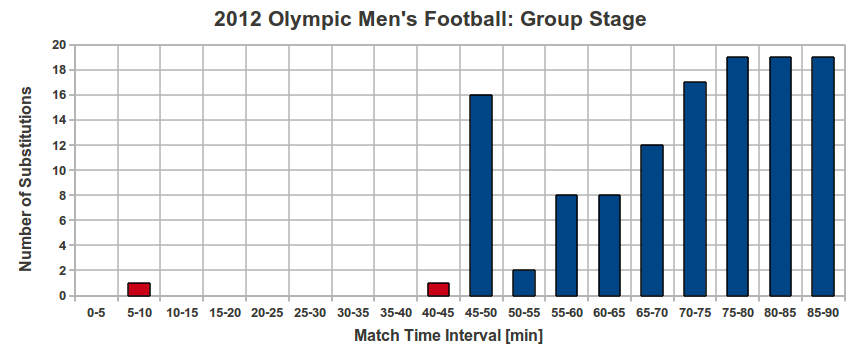Group stage substitutions at the 2012 Olympics
Categories: Team Performance
We continue our look at the 2012 Olympic men’s football competition by examining the substitution behavior through the group stage matches.
The following chart is the distribution of the substitution events during group stage matches at the Olympics. Time segments are 5 minutes long for a total of 18 segments over the 90 minutes. Stoppage time substitutions are included, of which there were three in the group stage (all in the second half).
There were 122 substitution events in the group stage, an average of 5.08 per match. There were only two substitutions in the first half and I’m not sure if both were forced by injury. As you saw in the European Championships, there is a huge spike in substitutions at the start of the second half and then a gradual increase in the substitution rate which hits its maximum in the final 15 minutes. It would be useful to plot a similar distribution for the group stages of the Africa Cup of Nations and the Euros, and I will do that in a future post.
Who is subbed for whom in the Olympics? As in other competitions, substitutions tend to be like-for-like, and midfielders are swapped in and out more than any other position. But in contrast to the Euros, substitutions result in a net increase in the number of defenders on the field. The table below displays the default positions of players involved on either side of a substitution event (I switched the in/out colors so that they make sense).
| Player Out | ||||||
| Goalkeeper | Defender | Midfielder | Striker | |||
| Player In | Goalkeeper | 0 | 0 | 0 | 0 | 0 |
| Defender | 0 | 6 | 7 | 6 | 19 | |
| Midfielder | 0 | 4 | 34 | 20 | 58 | |
| Striker | 0 | 4 | 18 | 23 | 45 | |
| 0 | 14 | 59 | 49 | |||
There have been seven goals scored by a substitute, two by one player (Giovani dos Santos vs Gabon). Here’s the complete list of the players:
| Scorelines | ||||||
| Substitute | Country | Sub Time | Goal Time | Substitution | At Goal | Final |
| Nicolás Lodeiro | Uruguay | 46 | 56 | 1-1 | 2-1 | 2-1 |
| Mohamed Salah | Egypt | 46 | 76 | 0-3 | 2-3 | 2-3 |
| Daniel Sturridge | England | 46 | 76 | 1-0 | 3-1 | 3-1 |
| Scott Sinclair | England | 72 | 73 | 1-1 | 2-1 | 3-1 |
| Giovani dos Santos | Mexico | 46 | 63 | 0-0 | 1-0 | 2-0 |
| Giovani dos Santos | Mexico | 46 | 90+2 | 0-0 | 2-0 | 2-0 |
| Marwan Mohsen | Egypt | 46 | 73 | 0-0 | 2-0 | 3-1 |
| Andrey Varankow | Belarus | 69 | 87 | 0-1 | 1-3 | 1-3 |
Below are the positions that these players replaced. In contrast to the European Championships, there were actually goals scored by upfield players who replaced defenders (four in all). Which is what you want when you make such a move, right?
| Player Out | ||||||
| Goalkeeper | Defender | Midfielder | Striker | |||
| Player In | Goalkeeper | 0 | 0 | 0 | 0 | 0 |
| Defender | 0 | 0 | 0 | 0 | 0 | |
| Midfielder | 0 | 1 | 1 | 0 | 2 | |
| Striker | 0 | 3 | 1 | 2 | 6 | |
| 0 | 4 | 2 | 2 | |||
So substitutions have been a bit more defensive in the Olympics than they have been during the Euros, but there have been just as many goals and more scored as a result of ‘attacking’ substitutions. We’ll repeat the whole process after the conclusion of the medal round this weekend.


